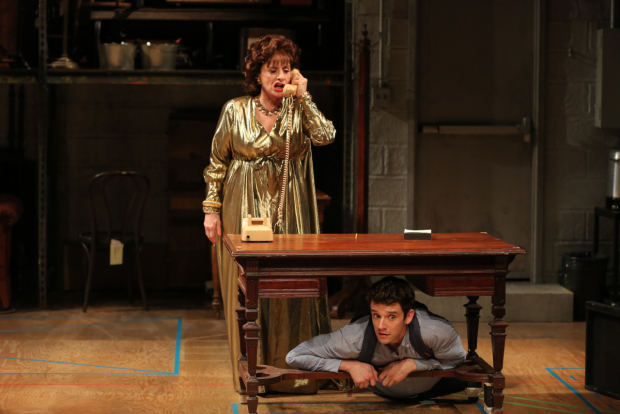Shows for Days

(© Joan Marcus)
Backstage tales are the just-so stories of the theater world. They explain to a curious public how these exotic creatures we call "show people" get their colorful and amorphous spots. It was just one year ago that Moss Hart's famous autobiography Act One was translated to Lincoln Center Theater's Broadway stage, where adoring fans could trace the playwright's steps from poverty to Pulitzer Prize-winning fame. Douglas Carter Beane's Shows for Days has now taken up residence at LCT's Mitzi E. Newhouse Theater, riffing on the same memoir genre like Act One's flamboyant second cousin once removed. (Hart's oft-produced comedy You Can't Take It With You even takes its fair share of Beane's playful jabs.) Like its buttoned-up predecessor, Shows for Days tugs at the theater-lover's heartstrings as the playwright indulges in his own adolescent nostalgia. But casual theatergoers be warned: If you don't know the secret handshake, you may be rejected at the door.
Not literally, of course. The Lincoln Center staff will let you sit through all two hours and ten minutes of Beane's fictionalized teenage years at the Prometheus Community Theater in Reading, Pennsylvania. But if you find drama queens more insufferable than exotic and have difficulty appreciating a Major Barbara joke, you might find yourself in a swirling sea of show references without a life raft to keep you afloat. For those insiders who can appreciate the niche humor, the play finely showcases Beane's razor-sharp wit — a talent we see his corresponding character hone throughout the play itself, foreboding Beane's future oeuvre of Tony-nominated works that includes The Little Dog Laughed, The Nance, and a number of popular Broadway librettos. Even so, as director Jerry Zaks builds the playwright's memories with just some chairs, tables, and gaff tape (a quintessentially theatrical set by John Lee Beatty, with complementary lighting by Natasha Katz), it becomes abundantly clear that this play is Beane's personal tribute to the people who gave him his start. We, the audience members, are merely onlookers, not participants.
While the story tends to push us away, Michael Urie does his best to welcome us into its world, filling the shoes of the playwright as the show's master of ceremonies and main character, Car. He narrates as Beane's present persona, using the same infectious smile and rambunctious energy that captivated audiences in Buyer & Cellar, the long-running solo show he recently took around the country. Urie can man a stage like no other, but he hits his highest notes within the play's storyline as the conflicted teenager who stumbles upon the Prometheus Theater one night in May 1973 on his way home to small-town Wyomissing.
Like Alice falling down the rabbit hole, Car is sucked into the world of the theater and its eccentric cast of characters: Sid, the troupe's lesbian manager (a comedic and heartfelt performance by Dale Soules); Clive, a homosexual and overtly theatrical African-American actor (a bellowing Lance Coadie Williams); Maria, the resident ingénue and diva in training (Zoë Winters, filling the histrionic archetype ); Damien, the company's closeted leading man (played by Jordan Dean with a careful mix of nonchalance and self-protective urgency); and last but not least, Irene, the theater's sanctimonious leader, appropriately played by Broadway matriarch Patti LuPone.
LuPone, a two-time Tony-winning powerhouse, is essentially who Irene would have been had she more talent and chutzpah. She traded her dreams of the New York stage for a community theater in Pennsylvania but will stop at nothing to make it a success — whatever that means within her miniscule domain. William Ivey Long gives her an immense collection of flowing robes (donned by all acting teachers since the beginning of time) in which to swirl on- and offstage in the show-boaty manner Ms. LuPone has perfected throughout her career. It's nothing new for the actress, but she flashes glimmers of her celebrated turn in Gypsy as she Momma Rose-s her young protégé, who, fortunately, is a willing tutee.
As he delves deeper into his theatrical lifestyle, Car hits several landmarks in his coming of age, which Urie portrays with crushing sincerity. Despite the hoards of pain it inflicts upon him, he radiates nothing but love for this place that has become his home away from home. And yet, the sentiment leaves us cold, as the candle Beane clearly holds for these figures in his own mind fails to make it to the stage. Rather than delve into these formative relationships, the story turns primarily on show-biz quips and the political game Irene is forced to play to save her threatened theater. The many personal and romantic entanglements among the company (largely of the homosexual variety, which in 1973 were kept clandestine), facilitate the plot. But beyond Car's one tragic heartbreak, the details of his formative relationships are left to our own imaginations. Community theater veterans can channel their own Irenes to empathize with that bittersweet combination of pity, resentment, and love, but if you're not in the club, you're sadly out of luck.










